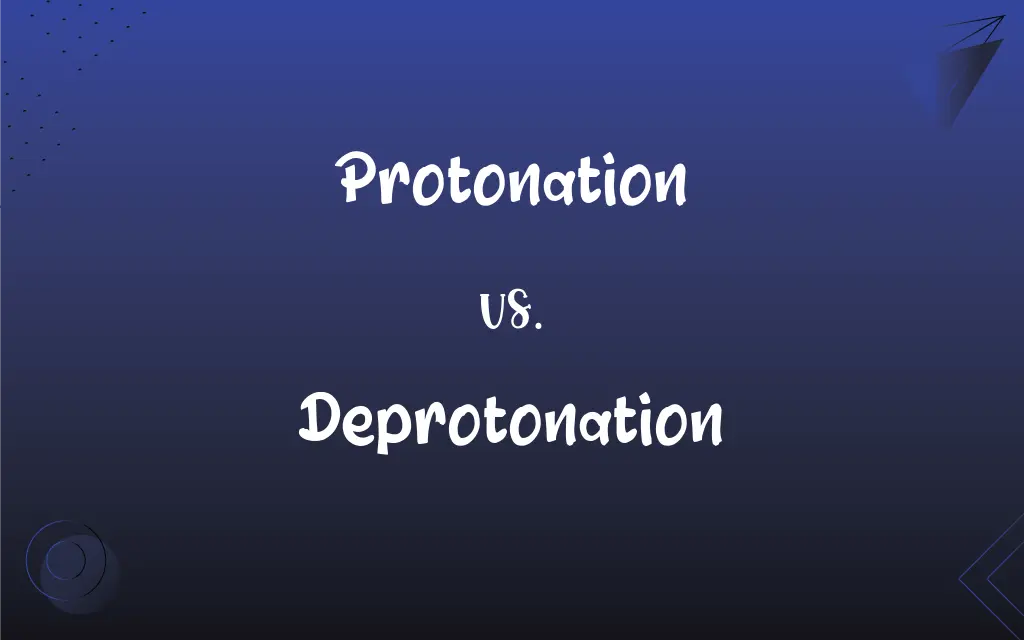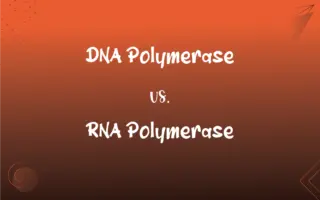Protonation vs. Deprotonation: What's the Difference?
Edited by Aimie Carlson || By Harlon Moss || Updated on October 23, 2023
Protonation is the addition of a proton (H⁺) to a molecule; deprotonation is the removal of a proton (H⁺) from a molecule.

Key Differences
Protonation refers to the process by which an atom or molecule gains a proton (H⁺) and thereby increases its positive charge. This process results in the formation of a more positively charged species. Deprotonation, on the other hand, is the opposite process where a proton is removed from an atom or molecule, leading to a decrease in its positive charge or an increase in its negative charge.
In protonation, the molecule or atom accepting the proton typically has a lone pair of electrons or a negative charge, allowing it to interact with and bind the H⁺ ion. Deprotonation, conversely, involves an atom or molecule that has at least one removable proton; this proton is then donated to another species, often a base.
Considering acids and bases, protonation is usually associated with the action of a base. A base accepts a proton and becomes protonated. Deprotonation, on the other hand, is typically associated with the action of an acid. When an acid donates a proton, it undergoes deprotonation.
From an energy perspective, protonation typically requires energy input, as it involves the addition of a charged species to another molecule. In contrast, deprotonation often releases energy, as it involves the removal of a charged species, leading to a more stable product.
Comparison Chart
Definition
The addition of a proton (H⁺) to a molecule.
The removal of a proton (H⁺) from a molecule.
ADVERTISEMENT
Resultant Charge
Increases the positive charge or neutralizes a negative charge.
Decreases the positive charge or makes a molecule more negative.
Associated Action
Typically with a base accepting a proton.
Usually with an acid donating a proton.
Energy Dynamics
Often requires energy input.
Typically releases energy.
Relation with pH
Raises pH when a base is protonated.
Lowers pH when an acid is deprotonated.
Protonation and Deprotonation Definitions
Protonation
The addition of a hydrogen ion to a molecule.
The nitrogen in amines undergoes protonation under acidic conditions.
ADVERTISEMENT
Deprotonation
The removal of a hydrogen ion from a molecule.
The hydrogen in phenols undergoes deprotonation under basic conditions.
Protonation
A chemical reaction resulting in an increase in positive charge.
In acidic conditions, water undergoes protonation to form hydronium ions.
Deprotonation
The transformation of an acid into its conjugate base.
When water acts as an acid, its deprotonation results in the formation of OH⁻.
Protonation
The process of gaining a proton (H⁺).
The ammonia molecule undergoes protonation to form ammonium.
Deprotonation
The process of losing a proton (H⁺).
Water undergoes deprotonation to form hydroxide ions in basic conditions.
Protonation
The act of a molecule or atom becoming a cation by accepting a proton.
The base, hydroxide (OH⁻), experiences protonation to form water.
Deprotonation
A chemical reaction resulting in a decrease in positive charge.
Acetic acid undergoes deprotonation to form acetate ions.
Protonation
The transformation of a base into its conjugate acid.
When water acts as a base, its protonation results in the formation of H₃O⁺.
Deprotonation
The act of a molecule or atom becoming an anion by releasing a proton.
The acid, hydronium (H₃O⁺), undergoes deprotonation to release a water molecule.
Protonation
(chemistry) The addition of a proton (hydrogen ion) to an atom, molecule or ion, normally to generate a cation. Category:en:Hydrogen
Deprotonation
(chemistry) The removal of a proton (hydrogen ion) from a molecule to form a conjugate base.
FAQs
What is protonation?
Protonation is the addition of a proton (H⁺) to a molecule.
What is deprotonation?
Deprotonation is the removal of a proton (H⁺) from a molecule.
Which molecule undergoes protonation, an acid or a base?
A base typically undergoes protonation when it accepts a proton.
How does deprotonation impact pH?
Deprotonation typically lowers pH when an acid is deprotonated.
What happens to a molecule's charge during deprotonation?
During deprotonation, a molecule's positive charge decreases or it becomes more negative.
How does protonation affect molecular stability?
Protonation can stabilize some molecules but destabilize others, depending on the context.
How is deprotonation related to acidity?
Acids tend to undergo deprotonation, donating a proton to another species.
Do protonation and deprotonation always occur in pairs?
In a given reaction, when one species undergoes protonation, another typically undergoes deprotonation.
Is protonation an endothermic or exothermic process?
Protonation typically requires energy input, making it often endothermic.
Which molecule undergoes deprotonation, an acid or a base?
An acid typically undergoes deprotonation when it donates a proton.
What results from the protonation of ammonia?
The protonation of ammonia results in the formation of ammonium ion (NH₄⁺).
Which molecule results from the deprotonation of water?
Deprotonation of water yields the hydroxide ion (OH⁻).
Is protonation a reversible process?
Yes, protonation can be reversed through deprotonation under suitable conditions.
Is the product of deprotonation always an anion?
Often, but not always. The product may be neutral or an anion depending on the initial species.
Can protonation change a molecule's reactivity?
Yes, protonation can enhance or diminish a molecule's reactivity, depending on the system.
Which is more common in basic environments, protonation or deprotonation?
In basic environments, deprotonation is more prevalent as bases accept protons.
Can all molecules undergo protonation?
No, only molecules with lone pairs or negative charges typically undergo protonation.
How does protonation affect pH?
Protonation often raises pH when a base is protonated.
Are protonation and deprotonation opposite processes?
Yes, protonation is the addition of a proton, while deprotonation is the removal of a proton.
Can a molecule undergo both protonation and deprotonation?
Yes, depending on the conditions, a molecule like water can both accept and donate a proton.
About Author
Written by
Harlon MossHarlon is a seasoned quality moderator and accomplished content writer for Difference Wiki. An alumnus of the prestigious University of California, he earned his degree in Computer Science. Leveraging his academic background, Harlon brings a meticulous and informed perspective to his work, ensuring content accuracy and excellence.
Edited by
Aimie CarlsonAimie Carlson, holding a master's degree in English literature, is a fervent English language enthusiast. She lends her writing talents to Difference Wiki, a prominent website that specializes in comparisons, offering readers insightful analyses that both captivate and inform.































































